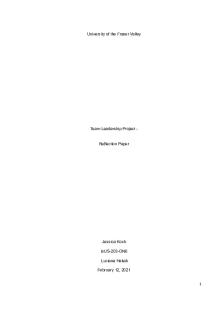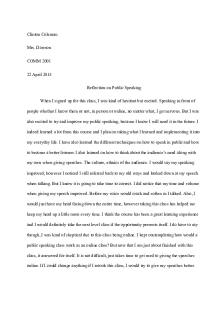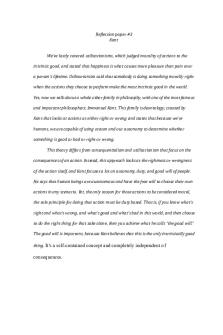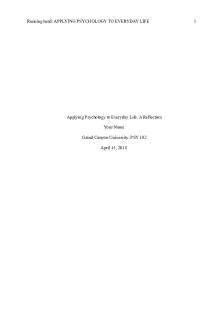PSY 102 Reflection Paper Template PDF

| Title | PSY 102 Reflection Paper Template |
|---|---|
| Course | General Psychology |
| Institution | Grand Canyon University |
| Pages | 7 |
| File Size | 105.7 KB |
| File Type | |
| Total Downloads | 75 |
| Total Views | 170 |
Summary
Download PSY 102 Reflection Paper Template PDF
Description
Running head: APPLYING PSYCHOLOGY TO EVERYDAY LIFE
Applying Psychology to Everyday Life: A Reflection Your Name Grand Canyon University: PSY 102 April 15, 2018
1
2 APPLYING PSYCHOLOGY TO EVERYDAY LIFE Applying Psychology to Everyday Life: A Reflection Psychology is everywhere you look. From the moment someone is born to their last days, the field of psychology explains many things that a person experiences in a lifetime. After spending a semester in Psychology 102, there were many things that I learned since the moment class started in January. By discussing topics such as sleep, personalities, and theories created by psychologists, I received a glimpse into my future as a teacher and my present life as a student and daughter. Looking at my personal life, professional life and academic career, this reflection will examine how I will use my new knowledge of psychology in these certain areas of my life. Personal Life As class begins to come close to an end, certain topics align well with different aspects of my life. One of those areas is my personal life. As a 20-year-old college student, a subject that related to me was the topic of sleep and how it related to my overall health and well-being. The lack of sleep affects everyone’s ability to comprehend simple day tasks, but it can truly make it difficult to tackle every day with a positive attitude. When someone does not get the amount sleep they need, symptoms of depression arise along with a decrease in academic performance and health. Depression is very common during college and it is stated that approximately 14.8% of students enrolled in college have experienced or are diagnosed with depression (Hershner & Chervin, 2014). With this statistic, it is likely that I will take my sleep more cautiously and actually sleep for more than 5-6 hours a night. Besides sleep, I will also use new knowledge on parenting styles to analyze my own life as well as applying it to my youth ministry work. Parenting styles are an aspect from PSY-102 that I can use now in multiple ways as well as in the future when I get married and begin to have a family of my own. There are four parenting styles such as, authoritarian, authoritative, uninvolved, and permissive. Authoritarian and un-
3 APPLYING PSYCHOLOGY TO EVERYDAY LIFE involved are both low responsive towards the children but authoritative and permissive have high levels of warmth and supportiveness (Grison & Gazzaniga, 2016). For now, I can use my new information to analyze my own life and how my parents style influenced me. Growing up in a Mexican household, my parents can definitely go under the authoritative category. They were and still are very strict with me, but they guide me in anything that I do and continue to support my decisions. This has definitely made me become more mature and respectful towards adults in my life. A study has shown that I am not the only one that has experienced this, children who have authoritative parents are usually more obedient and conform to adult standards. On the other hand, those children that have neglectful parents often misconduct in school and rarely engage (Lamborn, Mounts, Steinberg & Dornbusch, 1991). Personally, once I am older and have children of my own, I will strive to have an authoritative parenting style. It is important to figure out which type of parent you want to be when you’re young so that once you start dating someone, you can see if they’ll be a good match for you and your parenting style. Professional Life In my professional life, I will be a secondary education history high school teacher in Arizona. Two of the topics I will use daily would be Erikson’s Eight Stages of Psychosocial Development and stress. The eight stages of psychosocial development consist of trust vs. mistrust, autonomy vs. shame and doubt, initiative vs. guilt, industry vs. inferiority, identity vs. role confusion, intimacy vs. isolation, generativity vs. stagnation and integrity vs. despair. In my profession, I will be working not only with adolescents going through the identity vs. role confusion but also adult co-workers going through the young adulthood, middle adulthood or old age phase. As a teacher, I must understand that my students will be facing their own battles as trying to find their identity as they become young adults. Students will begin to question who they are
4 APPLYING PSYCHOLOGY TO EVERYDAY LIFE and how their ethnic and cultural background will influence their new identity and family relationships or friendships (Grison & Gazzaniga, 2016). By understanding the eight stages Erikson talked about, I will be able to understand where people are at in their lives. Additionally, in my profession I will have to deal with a lot of stress. Stress occurs to everyone, but I think as a teacher, it’ll be more frequent. The stress encountered will not be major life stressors but rather daily hassles. It is said that teacher burnout occurs because of the work stress, demands and self- efficacy of a teacher (Yu, Wang, Zhai, Dai, Yang, 2015). By learning how to use positive stress responses such as cleaning, praying or sleeping, I will be able to avoid teacher burnout. Not only will stress affect how long I teach for, but it can also affect my health. According to the GAS or the General Adaptation Syndrome, after being stressed by something for a long time, I can have a decrease in my immunity during the exhaustion phase and begin to get sick (Grison & Gazzaniga, 2016). This is very true because during finals week, I always get sick on the last days and begin my summer vacation in bed. By understanding stress, I will be able to help my students for a long time but also help my health by controlling how much stress I put on top of my body. Academic Career Academically, I can use the knowledge of memory and satisfaction of needs to help me become a better student. Memory is acquired in three steps, information is encoded, then storage and finally, the information is retrieved when needed. There are three types of memory as well, sensory, short and long. As a student, I would use long term memory the most as I study for exams and learn information for my major. Since I will be a college student studying history, it is important for me to remember information that will go into a declarative storage system. Declarative represents facts, data and events in your storage system (Grison & Gazzaniga, 2016). Al-
5 APPLYING PSYCHOLOGY TO EVERYDAY LIFE though memories can be tricky and easily manipulated, they are important in order to be successful in college. As well as memory, another topic that will help me be successful as a student in my academic career is understanding the satisfaction of needs hierarchy. The satisfaction of needs hierarchy according to Maslow’s theory is the arrangement of needs in order starting with the most basic needs. The five levels of needs are physiological, safety, belonging and love, esteem, and self-actualization. They start from the basic needs to survive such as oxygen and food and go up to self- actualization like graduating college. This pyramid is crucial to understand because if one is missing, it is hard to satisfy higher needs (Grison & Gazzaniga, 2016).
Areas of Overlap In psychology, there are certain topics that may overlap different areas of someone’s life. In the areas discussed above like personal life, professional life and academic career, topics such as stress, and personality overlap all three. For example, stress is applied to every part of someone’s life. Unfortunately, there is not a safe place where you may not be stressing. They all vary in severity, some can be daily hassles and occur every once in a while, while others can be life changing stressors and cause certain health issues if the stress is prolonged. Stress can occur at a job setting, home, in between families and even friendships. The second example is personalities. This was not discussed above but it is one that should be included. By knowing different personalities that people in your life may have, truly helps the interactions. From introverts to extroverts and those in between, not everybody is the same and therefore require different communication skills. As a teacher, it is important to re-
6 APPLYING PSYCHOLOGY TO EVERYDAY LIFE member that not every student will be volunteering on every question but simply stand back due to thinking more on paper. In the work place as well, each co- worker will have different forms of completing work and sometimes it may be hard to work in groups due to certain personalities. Another way personalities overlap is by going into your personal life you’re your personal life, there are those family members and friends you click with but then there are also those that need more effort. Finally, in the academic career, it can help a student understand their learning and collaboration style. By knowing these certain personalities, each person can learn to strive in each situation of their lives. Conclusion In conclusion, psychology is a topic that relates to everyone and is important for interactions and success in life. By learning how sleep can affect my health and performance to understanding the hierarchy of needs, it will make me a better person in life. Understanding memory, stress, psychosocial development and parenting styles will set me up for the future. It will not only affect me but also those around me. Starting with my family and friends to even the way I raise my children alongside my spouse. Psychology is something that should be taken seriously because it can improve things that we may not even realize need change. It opens new doors and goes inside the mind and behavior of those around us so that we can be successful and strive in daily tasks.
References
7 APPLYING PSYCHOLOGY TO EVERYDAY LIFE Grison, S., & Gazzaniga, M. (2016). Psychology in your life (2nd ed.). New York, NY: Norton Publishing Hershner, S. D., & Chervin, R. D. (2014). Causes and consequences of sleepiness among college students. Nature and Science of Sleep, 6, 73–84. http://doi.org/10.2147/NSS.S62907 Lamborn, S.D., Mounts, N.S., Steinberg, L., Dornbusch, S.M. (1991). Patterns of Competence and Adjustment among Adolescents from Authoritative, Authoritarian, Indulgent, and Neglectful Families. Child Development, 5, 1049-1065. https://doi.org/10.1111/j.14678624.1991.tb01588.x Yu, X., Wang, P., Zhai, X., Dai, H., Yang, Q. (2015). The Effect of Work Stress on Job Burnout Among Teachers: The Meditating Role of Self- Efficacy. Social Indicators Research, 3, 701- 708. https://doi.org/10.1007/s11205-014-0716-5...
Similar Free PDFs

PSY 102 Final Paper
- 7 Pages

IAT Activity PSY 102
- 2 Pages

Psy 102 assignment 2
- 3 Pages

PSY-102 Brain Project
- 4 Pages

Hss 102 film reflection
- 3 Pages

Reflection Paper
- 2 Pages

Reflection Paper
- 4 Pages

Reflection Paper
- 2 Pages

Reflection paper
- 3 Pages

Reflection Essay ON English 102
- 2 Pages

Template paper
- 1 Pages

DQ1 week 1 psy 102. v
- 1 Pages

PSY 211 Project One Template
- 3 Pages

PSY 211 Project Two Template
- 3 Pages
Popular Institutions
- Tinajero National High School - Annex
- Politeknik Caltex Riau
- Yokohama City University
- SGT University
- University of Al-Qadisiyah
- Divine Word College of Vigan
- Techniek College Rotterdam
- Universidade de Santiago
- Universiti Teknologi MARA Cawangan Johor Kampus Pasir Gudang
- Poltekkes Kemenkes Yogyakarta
- Baguio City National High School
- Colegio san marcos
- preparatoria uno
- Centro de Bachillerato Tecnológico Industrial y de Servicios No. 107
- Dalian Maritime University
- Quang Trung Secondary School
- Colegio Tecnológico en Informática
- Corporación Regional de Educación Superior
- Grupo CEDVA
- Dar Al Uloom University
- Centro de Estudios Preuniversitarios de la Universidad Nacional de Ingeniería
- 上智大学
- Aakash International School, Nuna Majara
- San Felipe Neri Catholic School
- Kang Chiao International School - New Taipei City
- Misamis Occidental National High School
- Institución Educativa Escuela Normal Juan Ladrilleros
- Kolehiyo ng Pantukan
- Batanes State College
- Instituto Continental
- Sekolah Menengah Kejuruan Kesehatan Kaltara (Tarakan)
- Colegio de La Inmaculada Concepcion - Cebu

